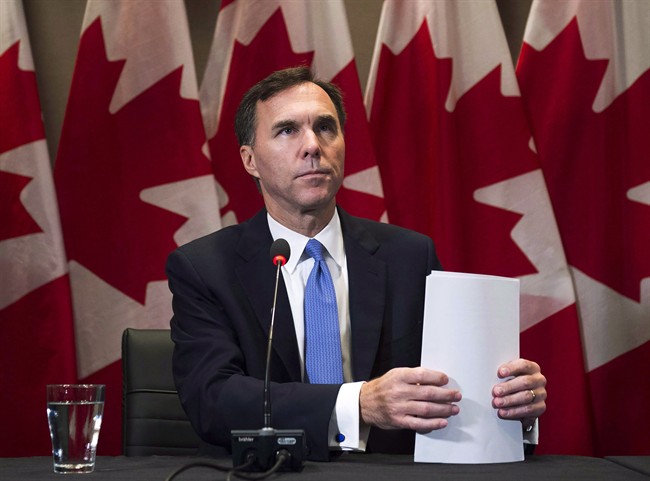Finance Minister Bill Morneau unveiled a series of measures Tuesday that he says will close loopholes in the federal tax system that disproportionately benefit wealthy Canadians.

The “fancy accounting schemes,” as Morneau dubbed them, include things like business owners “sprinkling” their total income among family members who sit in lower income tax brackets but don’t actually do work for the company. That can dramatically reduce the overall amount of personal income tax paid.
READ MORE: Why the CRA waives penalties on many Canadians who admit they didn’t pay taxes
Ottawa believes about 50,000 families across the country are employing this particular strategy, to the tune of $250 million in lost tax revenue per year.
WATCH: Bill Morneau outlines how tax ‘spreading’ loophole works

Other tax-dodging manoeuvres involve using private corporations as a substitute for a regular savings account or converting a private corporation’s regular income into capital gains, both of which can shelter the money from higher tax rates. It’s not illegal, the minister emphasized, but it’s not quite fair either.
Morneau, a successful businessman before he was drafted by the Liberal Party of Canada in 2015, acknowledged that he himself has likely benefited from one or more of these arrangements.
“My expectation is that these changes, over the long term, will mean that I’ll end up paying more tax,” he said.
The minister told reporters that he has no way of knowing exactly how much more, as he purposely avoided looking at how the measures would affect him personally when they were being considered.
‘Middle class’ benefits?
Morneau also repeatedly referred to the overall benefits these changes will have for middle-class Canadians.
Members of the middle class (a group which the federal Liberals have never clearly defined) will be able to rest easy in the knowledge that the tax system is fair, Morneau explained, and that they are not being burdened while people in higher pay grades reap additional benefits.
Asked how closing tax loopholes for the rich benefits middle- and low-income earners on a practical level, Morneau said it’s part of a broader push to ease the tax burden for those groups. Other measures have included the Canada Child Benefit and changes to the Canada Pension Plan, he said.
WATCH: Morneau explains why closing tax loopholes helps average Canadians

“As we grow the economy the benefits should not go disproportionately to one subset of Canadians, and that’s what we’re seeing happening and what we’re seeing happening at an increasing pace,” Morneau said.
According to Rhys Kesselman, the Canada Research Chair in Public Finance with the School of Public Policy at Simon Fraser University, the proposals announced Tuesday should indeed help level the playing field for all taxpayers — if they are implemented and the system is properly monitored by the Canada Revenue Agency (CRA).
“I think it’s a clear yes, so long as you are someone who subscribes to the notion that people should be taxed on their individual incomes, which is the basis for the Canadian tax system,” Kesselman said.
“Will it help the middle and lower income groups? I would say it will collect more revenue.”
Even an extra quarter or half-a-billion dollars per year in government coffers could help bolster public health care, education and infrastructure, he said. It may also help make budgetary room for tax cuts aimed at middle- and lower-income earners down the line.
“These changes, if they’re done, will help not only federal revenues but provincial revenues too, because they piggyback onto the personal income tax, except in Quebec, and corporate tax as well,” Kesselman noted.
But one thing they won’t do is tackle the most significant source of lost tax revenue in Ottawa: offshore accounts designed to hide earnings from the CRA.
READ MORE: Unclear if Canada has paid for Panama Papers leaks
Kesselman said that type of tax avoidance is “pretty tough to deal with.”
“The Panama Papers happen once in a lifetime, maybe,” he said. “There are probably much bigger dollars there, but where’s the leverage for the government to attack them? Other than when they find it, dealing harshly and publicizing it and hoping to scare other people who would consider doing it.”
The NDP, however, say the Liberals are “ignoring the larger issue of tax evasion” and still haven’t gone after the controversial stock option deduction, which allows executives to cash in company stock and have the profits taxed at a vastly reduced rate.
“It is estimated up to $8 billion is lost to tax evasion and avoidance every year,” the NDP said in a release.
“In the best case scenario, the Liberals’ so-called ‘income sprinkling’ measure could only recover 3 per cent of that total when and if the measure is fully implemented.”
What’s next?
The government is launching a 75-day public consultation period to allow stakeholders to examine and weigh in on the proposals.
Legislation making the changes, and applying them retroactively to today’s date, will be coming “in an expeditious fashion” once the consultations are finished, Morneau promised.




Comments